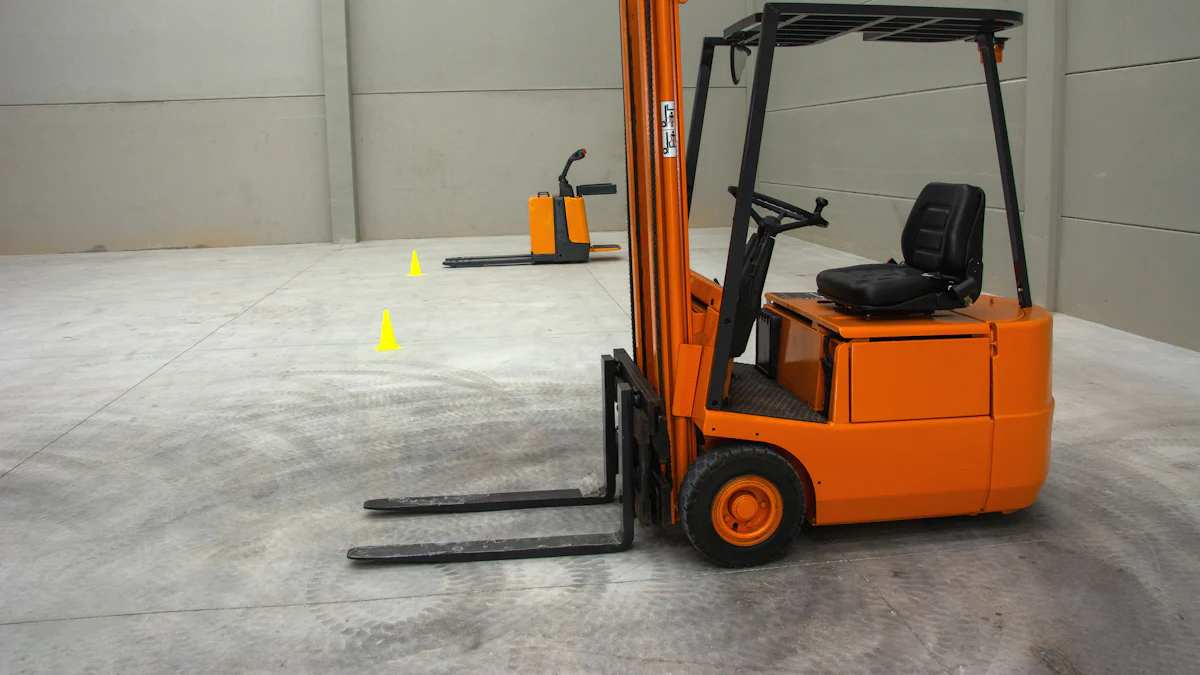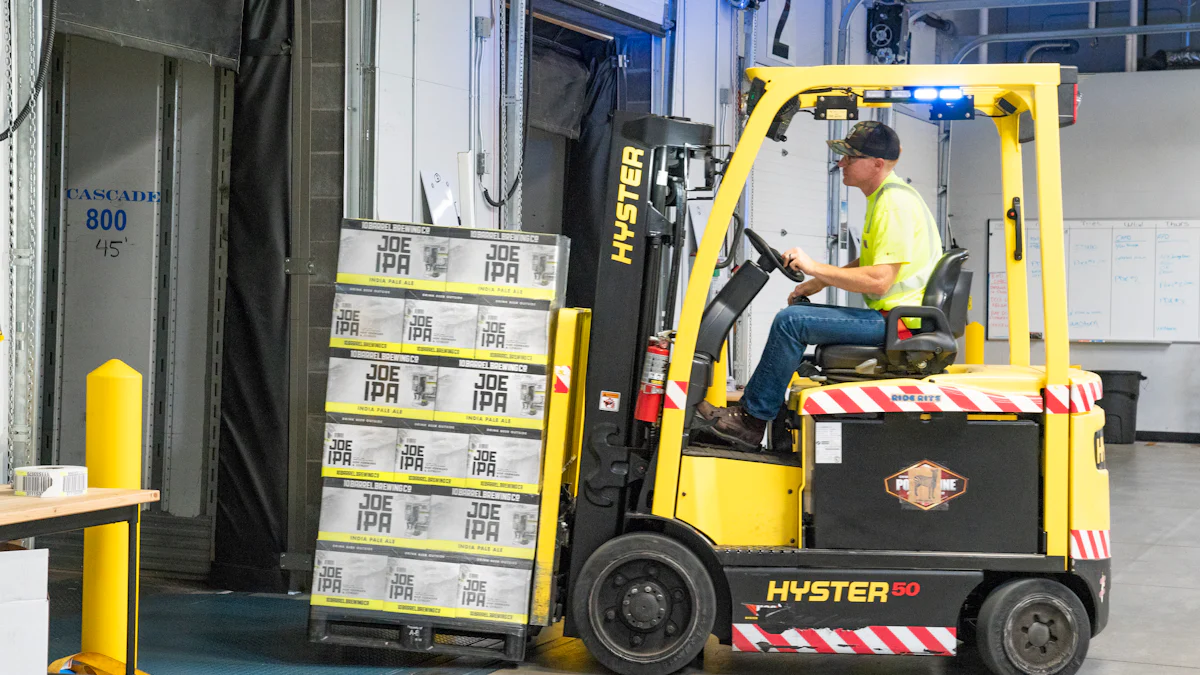
When it comes to rough terrain pallet jacks, making the right choice is crucial for seamless operations. Understanding the nuances between various types can significantly impact your efficiency and productivity. Today, we delve into the realm of pallet jacks, focusing on the two primary options: electric and gas powered. Each type offers distinct advantages tailored to specific needs, ensuring you find the perfect fit for your requirements.
Understanding Rough Terrain Pallet Jacks
What Are Rough Terrain Pallet Jacks?
Rough terrain pallet jacks, also known as All Terrain Pallet Jacks, are specifically designed for navigating challenging landscapes effortlessly. These robust pallet jacks are engineered to ensure stability and ease of transport even in the most demanding conditions. With features like adjustable forks, oversized pneumatic tires, and a weight-bearing capacity ranging from 1000 lbs to 4000 lbs, these jacks offer versatility across various operational environments.
Definition and primary uses
Tailored for rugged and uneven surfaces, rough terrain pallet jacks excel in outdoor settings such as construction sites, lumber yards, and farms. Their maneuverability and durability make them ideal for industries that handle material tasks in work yards or warehouses. The ability to function on uneven ground sets them apart, providing efficient handling options for operators.
Key features and capabilities
- Cost-effectiveness: Offering both manual and gas-powered options.
- Powered drive and lift capabilities: Ensuring efficient material handling.
- Adjustable forks: Adaptable to different load sizes.
- Oversized pneumatic or foam-filled tires: Providing stability on rough terrains.
- Wide straddle: Enhancing balance during operation.
- Sealed wheel bearings: Minimizing maintenance requirements.
Why Choose a Rough Terrain Pallet Jack?
Rough terrain pallet jacks cater to specific industries where stability and mobility are paramount. Their seamless integration into various operational environments makes them a valuable asset for businesses looking to enhance efficiency.
Benefits for specific industries
Industries such as construction, agriculture, and warehousing benefit greatly from the adaptability of rough terrain pallet jacks. These jacks facilitate the movement of heavy loads over uneven landscapes with ease, ensuring productivity remains uninterrupted even in challenging conditions.
Common applications and scenarios
- Construction Sites: Maneuvering materials on rugged terrains effortlessly.
- Agricultural Settings: Transporting goods across farms with stability.
- Warehousing Operations: Efficiently moving loads within warehouses regardless of surface conditions.
Electric Rough Terrain Pallet Jacks

Advantages of Electric Pallet Jacks
Electric pallet jacks, powered by efficient electric motors, offer a range of benefits that can elevate your operational prowess. Let’s delve into the advantages that make electric pallet jacks a compelling choice for your rough terrain handling needs.
Environmental benefits
- Eco-Friendly Operation: Embrace sustainability with electric power.
- Zero Emissions: Reduce your carbon footprint effortlessly.
- Quiet Performance: Operate smoothly without noise pollution.
Lower operating costs
- Cost-Efficient Solution: Save on fuel expenses and maintenance.
- Energy Savings: Enjoy economical operations with reduced energy consumption.
- Long-Term Financial Gains: Invest wisely for lasting cost-effectiveness.
Ease of use and maintenance
- User-Friendly Design: Simplify operations with intuitive controls.
- Minimal Maintenance Requirements: Ensure smooth functionality with ease.
- Operator Comfort: Prioritize ergonomic features for enhanced user experience.
Disadvantages of Electric Pallet Jacks
While electric pallet jacks offer numerous advantages, it’s essential to consider potential drawbacks to make an informed decision tailored to your specific requirements.
Initial cost considerations
- Upfront Investment: Acknowledge initial purchase costs for long-term benefits.
- Budget Planning: Factor in the initial expense against future savings and efficiency gains.
Battery life and charging requirements
- Battery Management: Monitor battery levels for uninterrupted operations.
- Charging Infrastructure: Establish a reliable charging setup for consistent performance.
Performance limitations in extreme conditions
- Operational Challenges: Address limitations in harsh weather or rugged terrains effectively.
- Adaptability Concerns: Evaluate performance under extreme conditions for optimal results.
Gas Powered Rough Terrain Pallet Jacks
Advantages of Gas Powered Pallet Jacks
Gas powered pallet jacks offer compelling advantages that cater to specific operational needs, ensuring seamless performance and enhanced efficiency. Let’s explore the distinctive benefits that make gas powered pallet jacks a valuable asset for rough terrain handling.
Higher power output
- Experience unparalleled power delivery, enabling swift and robust material transport.
- Achieve optimal performance with increased power capabilities, enhancing productivity.
- Seamlessly maneuver heavy loads across challenging landscapes with superior force.
Longer operational range
- Extend your operational reach without constraints, maximizing workflow efficiency.
- Ensure continuous operations over extended distances, reducing downtime significantly.
- Enhance logistical capabilities by covering larger areas effortlessly.
Better performance in rugged conditions
- Conquer rough terrains with ease, thanks to enhanced rugged terrain handling features.
- Tackle demanding landscapes confidently, maintaining stability and control throughout.
- Optimize productivity in challenging environments with reliable and durable performance.
Disadvantages of Gas Powered Pallet Jacks
While gas powered pallet jacks offer notable advantages, it’s essential to consider potential drawbacks to make an informed decision aligned with your specific requirements. Understanding these limitations can guide you towards selecting the most suitable equipment for your operational needs.
Environmental impact
- Acknowledge the environmental footprint associated with gas-powered equipment operation.
- Consider sustainability implications and explore eco-friendly alternatives for reduced impact.
- Evaluate long-term environmental consequences to align with green initiatives effectively.
Higher fuel and maintenance costs
- Factor in increased fuel expenses when utilizing gas-powered pallet jacks for daily operations.
- Plan maintenance budgets meticulously to address higher upkeep requirements adequately.
- Calculate total cost of ownership including fuel consumption and maintenance expenditures diligently.
Noise and emissions concerns
- Address noise pollution concerns related to gas-powered machinery operation in work environments.
- Mitigate emissions impact by exploring noise-reducing measures or alternative solutions.
- Prioritize employee well-being by implementing noise control strategies where applicable.
Key Factors to Consider When Choosing
Operational Environment
Indoor vs. outdoor use
- Consider the operational setting where your rough terrain pallet jack will be utilized.
- Evaluate the advantages of indoor and outdoor applications for your specific needs.
- Assess the adaptability of the pallet jack to varying environmental conditions.
Terrain type and conditions
- Analyze the nature of terrains your pallet jacks will navigate.
- Take into account the challenges posed by different terrains and surfaces.
- Ensure that the chosen pallet jack can handle the roughness of various landscapes.
Budget and Cost Analysis
Initial investment
- Calculate the initial costs associated with acquiring a rough terrain pallet jack.
- Plan your budget considering both short-term and long-term financial implications.
- Determine if the initial investment aligns with your operational requirements.
Long-term operational costs
- Estimate the ongoing expenses related to maintenance and operation of the pallet jack.
- Project long-term operational costs based on usage frequency and maintenance needs.
- Anticipate potential cost fluctuations over time to ensure financial sustainability.
Performance Requirements
Load capacity
- Identify the maximum load capacity required for your daily operations.
- Match the load capacity of the pallet jack to your typical material handling needs.
- Ensure that the chosen pallet jack can efficiently lift and transport loads within your specified range.
Frequency of use
- Assess how frequently you will utilize the rough terrain pallet jack in your operations.
- Consider durability factors based on expected usage intensity and frequency.
- Optimize performance by selecting a pallet jack that aligns with your utilization patterns.
Specific job requirements
- Tailor your choice based on specific tasks or functions unique to your industry.
- Customize features or capabilities to meet specialized job demands effectively.
- Ensure that the selected rough terrain pallet jack enhances productivity in line with job-specific requirements.
- In your quest for the ideal rough terrain pallet jack, consider the diverse benefits each type offers. Electric pallet jacks, with their ergonomic design and efficient electric motors, ensure seamless operations. They enhance productivity by swiftly moving heavy loads across various terrains. On the other hand, gas-powered pallet jacks excel in rugged conditions, providing robust performance and extended operational range. Assess your specific needs meticulously to make an informed decision that aligns with your operational requirements. Remember, choosing the right pallet jack tailored to your needs is key to optimizing efficiency and workflow productivity.
Post time: Jul-01-2024
